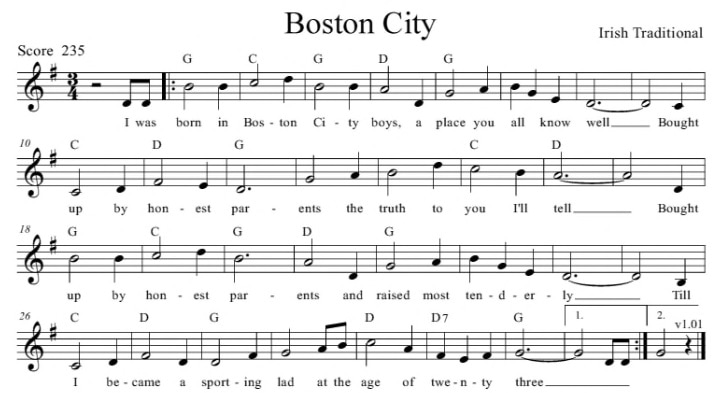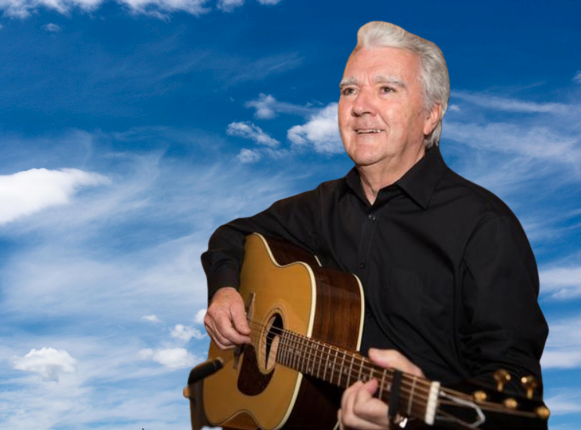The Boston Burglar lyrics and chords
Trad. The sheet music is included. This song has been around since the 1940s Its origins are American but is more popular in Ireland thanks to Johnny McEvoy [ song lyrics ] who made it famous in Ireland in the 1960s, Also recorded by the late Dermot O'Reilly. It's also called ''Boston City''.
I[D] was born and[G] raised in[D] Bos[A]ton,a[D] place you all know well,
Brought[G] up by[A] honest[D] parents,the truth to you I'll [A]tell,
Brought[D] up by[G] honest[D] par[A]ents,and[D] raised most tenderly,
Till[G] I be[A]came a[D] sporting lad at the[A] age of twenty[D] three,
[2]
My character was taken and I was sent to jail,
My friends they came and tried in vain to get me out on bail,
The jury found me guilty,and the clerk he wrote it down,
The judge he passed the sentence,I was bound for Charlestown.
[3]
They placed me on an east bound train on a cold December's day,
And every station we passed by you could hear the people saw,
There goes the Boston burguler,in cold chains he is bound,
For one crime or anothr he is bound for Charlestown.
[4]
All you who have your freedom,take warning if you can,
And dont go round the syreets at night,breaking laws of God or man,
For if you do you'll surly loose and find yourself like me,
Serving up full twenty years in a penatentury
Brought[G] up by[A] honest[D] parents,the truth to you I'll [A]tell,
Brought[D] up by[G] honest[D] par[A]ents,and[D] raised most tenderly,
Till[G] I be[A]came a[D] sporting lad at the[A] age of twenty[D] three,
[2]
My character was taken and I was sent to jail,
My friends they came and tried in vain to get me out on bail,
The jury found me guilty,and the clerk he wrote it down,
The judge he passed the sentence,I was bound for Charlestown.
[3]
They placed me on an east bound train on a cold December's day,
And every station we passed by you could hear the people saw,
There goes the Boston burguler,in cold chains he is bound,
For one crime or anothr he is bound for Charlestown.
[4]
All you who have your freedom,take warning if you can,
And dont go round the syreets at night,breaking laws of God or man,
For if you do you'll surly loose and find yourself like me,
Serving up full twenty years in a penatentury
Boston Burglar Sheet Music In G
Alternative guitar chords for the key of G Major.
I[G] was born and[C] raised in[G] Bos[D]ton,a[G] place you all know well,
Brought[C] up by[D] honest[G] parents,the truth to you I'll [D]tell,
Brought[G] up by[C] honest[G] par[D]ents,and[G] raised most tenderly,
Till[C] I be[D]came a[G] sporting lad at the[D] age of twenty[G] three,
I[G] was born and[C] raised in[G] Bos[D]ton,a[G] place you all know well,
Brought[C] up by[D] honest[G] parents,the truth to you I'll [D]tell,
Brought[G] up by[C] honest[G] par[D]ents,and[G] raised most tenderly,
Till[C] I be[D]came a[G] sporting lad at the[D] age of twenty[G] three,
The Boston Burglar song is an iconic traditional folk song that has been sung and passed down through generations for over a century. Its origins can be traced back to the late 19th century and it continues to be a popular song, with numerous recordings by various artists. The song tells the story of a notorious thief who robs a wealthy merchant in Boston, only to be caught and sent to prison. It is a captivating tale that has captured the imagination of many and has become a significant part of American folk music history.
The roots of the Boston Burglar song can be traced back to Ireland, where it originated as a traditional Irish ballad called 'The Wexford Girl'. The song tells the story of a young woman who falls in love with a highwayman and eventually joins him in his life of crime. The ballad was first published in a collection of Irish songs in 1885, but it wasn't until the late 19th century that it made its way to America and was transformed into the Boston Burglar song.
The song has undergone several variations and adaptations over the years, with different versions being sung in different regions of America. The most popular version of the song is the one that originated in the Appalachian region of the United States. This version has a more upbeat and lively melody, which makes it a perfect song for dancing and singing along.
One of the reasons for the enduring popularity of the Boston Burglar song is its catchy and memorable melody. The song is typically sung in a call-and-response format, with one person singing the verses and the rest of the group joining in for the chorus. This makes it an ideal song for group singing and creates a sense of camaraderie and community. The simple and repetitive chorus also makes it easy for people to learn and sing along, adding to its appeal.
The lyrics of the Boston Burglar song are also a significant factor in its popularity. The story of a cunning and daring thief who robs a wealthy merchant in the bustling city of Boston is a captivating and intriguing one. It is a tale of adventure, romance, and betrayal that has all the elements of a classic folk song. The lyrics paint a vivid picture of the life of a criminal, with references to the luxuries and dangers of being a highwayman. The mention of Boston, a prominent and prosperous city in America, adds to the allure of the song.
Moreover, the Boston Burglar song also has a historical significance. It provides a glimpse into the criminal underbelly of the late 19th and early 20th centuries in America. The song reflects the struggles and hardships faced by the working class, who often turned to a life of crime to make ends meet. It also sheds light on the justice system of the time, where harsh punishments were meted out to criminals. This adds a layer of depth to the song and makes it more than just a simple folk tale.
The Boston Burglar song has also been adapted and recorded by numerous artists over the years, solidifying its place in American folk music history. Some notable recordings include those by Woody Guthrie, Johnny McEvoy Joan Baez, and Bob Dylan. Each artist has put their own spin on the song, adding to its timeless appeal. The song has also been featured in popular media, such as films, television shows, and even video games, reaching a wider audience and keeping the song relevant in modern times.
In conclusion, the Boston Burglar song is more than just a traditional folk song. It is a piece of American history, a reflection of the struggles and triumphs of the working class, and a testament to the enduring power of music. Its catchy melody, captivating lyrics, and historical significance have ensured its place in the hearts of many and have cemented it as an iconic song in American folk music. The Boston Burglar song continues to be sung and enjoyed by people of all ages and will undoubtedly be passed down for generations to come.
The roots of the Boston Burglar song can be traced back to Ireland, where it originated as a traditional Irish ballad called 'The Wexford Girl'. The song tells the story of a young woman who falls in love with a highwayman and eventually joins him in his life of crime. The ballad was first published in a collection of Irish songs in 1885, but it wasn't until the late 19th century that it made its way to America and was transformed into the Boston Burglar song.
The song has undergone several variations and adaptations over the years, with different versions being sung in different regions of America. The most popular version of the song is the one that originated in the Appalachian region of the United States. This version has a more upbeat and lively melody, which makes it a perfect song for dancing and singing along.
One of the reasons for the enduring popularity of the Boston Burglar song is its catchy and memorable melody. The song is typically sung in a call-and-response format, with one person singing the verses and the rest of the group joining in for the chorus. This makes it an ideal song for group singing and creates a sense of camaraderie and community. The simple and repetitive chorus also makes it easy for people to learn and sing along, adding to its appeal.
The lyrics of the Boston Burglar song are also a significant factor in its popularity. The story of a cunning and daring thief who robs a wealthy merchant in the bustling city of Boston is a captivating and intriguing one. It is a tale of adventure, romance, and betrayal that has all the elements of a classic folk song. The lyrics paint a vivid picture of the life of a criminal, with references to the luxuries and dangers of being a highwayman. The mention of Boston, a prominent and prosperous city in America, adds to the allure of the song.
Moreover, the Boston Burglar song also has a historical significance. It provides a glimpse into the criminal underbelly of the late 19th and early 20th centuries in America. The song reflects the struggles and hardships faced by the working class, who often turned to a life of crime to make ends meet. It also sheds light on the justice system of the time, where harsh punishments were meted out to criminals. This adds a layer of depth to the song and makes it more than just a simple folk tale.
The Boston Burglar song has also been adapted and recorded by numerous artists over the years, solidifying its place in American folk music history. Some notable recordings include those by Woody Guthrie, Johnny McEvoy Joan Baez, and Bob Dylan. Each artist has put their own spin on the song, adding to its timeless appeal. The song has also been featured in popular media, such as films, television shows, and even video games, reaching a wider audience and keeping the song relevant in modern times.
In conclusion, the Boston Burglar song is more than just a traditional folk song. It is a piece of American history, a reflection of the struggles and triumphs of the working class, and a testament to the enduring power of music. Its catchy melody, captivating lyrics, and historical significance have ensured its place in the hearts of many and have cemented it as an iconic song in American folk music. The Boston Burglar song continues to be sung and enjoyed by people of all ages and will undoubtedly be passed down for generations to come.




